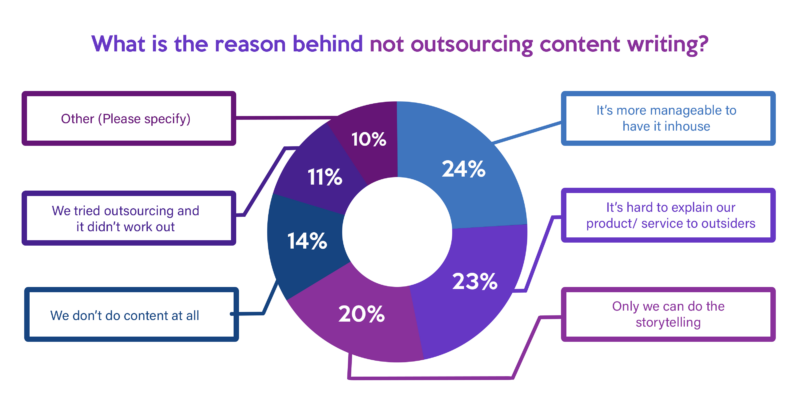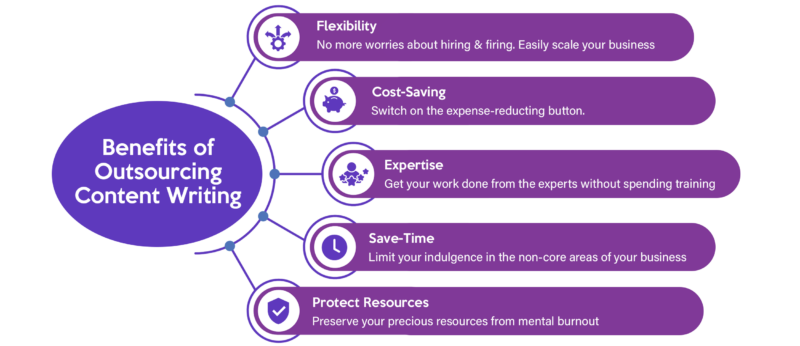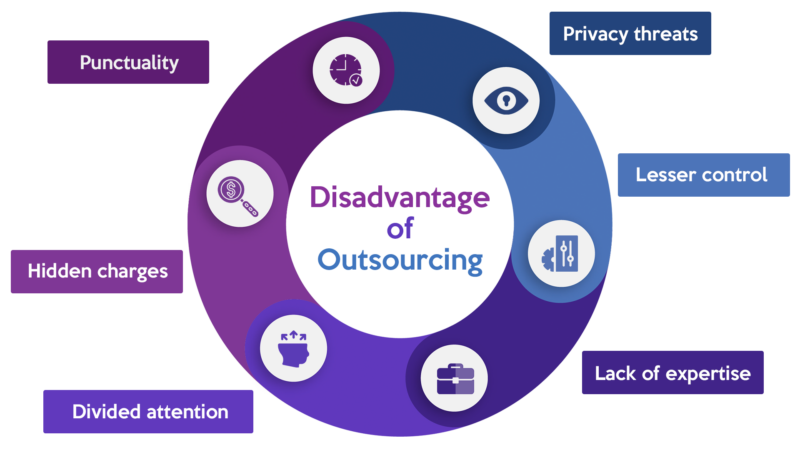In our modern, digitally-driven world, content forms the core essence of any internet-based business. It’s the distinctive voice that broadcasts your brand’s narrative to a global audience, persuading visitors to delve deeper into your offerings. However, the source and procurement of your content can greatly influence the trajectory of your business.

This piece undertakes an extensive exploration of the phenomenon of outsourcing content writing, shedding light on the unvarnished realities associated with this practice.
Understanding Outsourcing Content Writing

Outsourcing content writing is a strategic decision that involves the delegation of content creation tasks to individuals or agencies outside of your company, as opposed to relying on your internal workforce to produce these materials. When we speak about this type of outsourcing, we’re referring to the collaboration with external resources such as freelance writers, specialized content writing agencies, or even broader platforms that serve as a bridge between businesses and a pool of talented writers with various skills and expertise.
The breadth and diversity of content that can be outsourced are virtually limitless. Businesses can leverage external resources for everything from crafting compelling blog posts that drive traffic and engagement, to writing product descriptions that can convert readers into customers. This also extends to producing newsletters that keep your audience updated about the latest news and developments from your company and creating content for social media platforms to maintain a strong, engaging online presence.
Outsourcing is often brought into the picture under a few common scenarios. A business may consider outsourcing its content writing needs when there’s an ambition to amplify content production, reaching a broader audience and covering more ground in a shorter time span. This strategy provides an efficient solution to increase the volume and reach of content without overstretching the internal team’s capabilities.
On another note, if a company acknowledges a gap in the proficiency or skill set within their in-house team, outsourcing can serve as a viable solution. This is particularly pertinent when a business lacks team members who possess strong writing skills or a deep understanding of crafting content tailored to specific platforms and audiences.
Furthermore, outsourcing can be a strategic choice for businesses aiming to streamline operations and enhance productivity. By delegating content creation to external professionals, a company can free up valuable time for its team to concentrate on core business functions. This ensures that the business continues to operate smoothly while the content, a vital element in today’s digital landscape, is taken care of by dedicated professionals.
The Unapologetic Truth About Outsourcing Content Writing
Like every business decision, outsourcing content writing has its fair share of pros and cons, and understanding these is crucial.
Advantages of Outsourcing Content Writing

A Variety of Writing Styles and Perspectives
One of the significant advantages of outsourcing content writing is the access it gives you to a wide range of writing styles and perspectives. Every writer has a unique voice and viewpoint, which means outsourcing your content creation can infuse your material with a diversity of tones and angles. This not only enriches your content but also makes it more engaging and exhaustive. This wide variety could cater to a broader audience, potentially enhancing your brand reach and engagement.
A More Cost-Effective Method
Another prominent benefit of outsourcing content writing is that it can prove to be much more cost-effective than maintaining a team of in-house writers. When you choose to outsource, you essentially pay only for the specific content you need, rather than having to invest in full-time salaries, benefits, and continuous training for in-house content writers. This approach can lead to considerable cost savings while ensuring you receive high-quality content tailored to your specific needs.
Time Efficiency
The practice of outsourcing content writing also offers the significant advantage of time efficiency. Creating quality content requires a significant amount of time and effort, which could be better spent focusing on other crucial aspects of your business. When you outsource your content creation, you free up valuable time for you and your team to concentrate on core business operations and strategic planning, thereby enhancing overall productivity and efficiency.
Access to Specialized Knowledge and Expertise
Outsourcing your content writing needs also means you’re tapping into a pool of skilled professionals with specialized knowledge and expertise in the field. These content providers stay abreast of the latest trends, evolving SEO strategies, and changes in algorithms that can greatly influence the effectiveness of your content. This means that when you outsource, you’re not just buying content; you’re also gaining access to industry insights and cutting-edge strategies that can help your content stand out and achieve your business goals.
Potential Drawbacks of Outsourcing Content Writing

Possible Loss of Content Control
One of the potential downsides of outsourcing content writing is the risk of losing some level of control over your content. When you outsource, you entrust your brand’s message to external individuals or agencies who may not fully grasp your company’s unique style, tone, and voice. This could lead to a potential dilution of your brand’s distinctiveness, which is an essential aspect of building brand identity and connecting with your audience. While most professional content writers are skilled at adapting to various brand voices, it is an area where careful consideration and clear communication is necessary to maintain your brand’s unique character.
Inconsistency in Branding
Another potential drawback of outsourcing is the risk of inconsistent branding. Your brand’s voice is an integral part of your corporate identity and shapes how your audience perceives your company. With different writers working on your content, there might be subtle differences in style, tone, and voice, leading to potential inconsistencies that might confuse your audience. This is particularly important in content marketing, where consistent branding across various content pieces is crucial for building brand recognition and loyalty.
Communication Challenges
Outsourcing also carries the potential risk of communication gaps between your team and the outsourced content writers or agencies. This can occur due to differences in time zones, language barriers, or simply misunderstandings regarding project expectations and requirements. Such miscommunications can significantly impact the final output, leading to delays, additional revisions, and, in some cases, content that doesn’t meet your specifications or quality standards.
Possible Quality Issues
Quality is a key concern when outsourcing content writing, particularly when cost-cutting measures lead to working with cheaper, less experienced writers or agencies. While outsourcing can save you significant resources, opting for lower-priced services may compromise the quality of your content. Poorly written content, plagued by grammatical errors, inappropriate tone, or irrelevant information, can negatively impact your brand’s image and effectiveness in engaging your audience. Thus, it’s crucial to ensure that cost-cutting doesn’t lead to quality compromise.
Confidentiality Risks
Finally, outsourcing content writing could pose a risk to your company’s sensitive information. When you share critical company data or proprietary information with external teams, there is always a risk of confidentiality breaches. This is particularly relevant in industries where data security is paramount, and confidentiality breaches can have severe legal and reputational consequences. As such, if you choose to outsource your content writing, it’s essential to have robust confidentiality agreements in place and only share necessary information.
Factors to Consider Before Outsourcing Content Writing
Before you decide to outsource, it’s essential to consider several factors:
Evaluating your business’s content needs
Assess your content requirements and determine whether your in-house team can handle it. If not, outsourcing might be the way to go.
Weigh the pros and cons
Consider your business’s unique circumstances and carefully weigh the advantages and disadvantages of outsourcing.
Emphasize clear communication
If you decide to outsource, ensure that there’s a clear line of communication with the outsourced team to avoid any misunderstandings.
Effective management and monitoring
Regular monitoring and feedback are crucial to maintain the quality of the outsourced content.
Address security concerns
Take measures to protect sensitive information and establish clear confidentiality guidelines with the outsourced team.
Practical Examples and Case Studies from the Business World
Outsourcing content creation has proven to be highly advantageous for several companies across different sectors. The fruits of this strategy are evidenced in real-world scenarios, demonstrating the tangible benefits outsourcing can bring when properly managed.
Take the example of Slack, the well-known business communication platform. To keep up with the demands of regular, consistent content production and to maintain the high quality and engagement levels they aimed for, Slack turned to outsourcing. By partnering with skilled external content creators, they successfully sustained a regular posting schedule on their blog. These posts weren’t just frequent; they were also enriched with high-quality information and engaging narratives, effectively serving Slack’s content objectives and reinforcing its brand value to its audience. This successful implementation of outsourcing shows how businesses can boost their content production and engagement without overburdening their internal teams.
However, outsourcing content writing isn’t without its challenges, as evidenced by the experiences of some businesses. For example, a small e-commerce company decided to outsource its content writing, with the expectation of enhancing its content output and quality. However, they were met with challenges that had a significant impact on their brand. The primary issue they faced was the inconsistency in the voice and style of their branding across the outsourced content. This inconsistency resulted in confusion among their customers, and it gradually diluted the identity of their brand, which was previously well-established and recognizable. This unfortunate experience underscores the fact that while outsourcing can be highly beneficial, it can also present obstacles if not properly managed.
These contrasting examples underline the importance of meticulous consideration before deciding to outsource content writing. Each business has unique needs and circumstances, and what works for one might not work for another. Thus, it’s crucial to evaluate your specific needs and capabilities before opting to outsource. Furthermore, when outsourcing is chosen, effective management of the process, clear communication with the writers, and careful monitoring of the output are paramount to ensure the benefits outweigh the potential pitfalls.
The Bottom Line: Is Outsourcing Content Writing Right for Your Business?
The decision to outsource content writing is a significant one, and it needs to be carefully evaluated and determined based on your business’s unique requirements, available resources, and capabilities. Outsourcing certainly comes with a myriad of potential benefits that can enhance the efficiency, reach, and diversity of your content. However, it’s important to note that this approach may not necessarily be the optimal choice for every business.
In some cases, a business may already possess a robust in-house team, well-versed in the art of content creation. If your team is proficient at generating high-quality content, consistently and at the pace your business demands, then maintaining your content production in-house could indeed be the best course of action. This could also allow you to maintain a tight control over the style, tone, and voice of your content, ensuring consistency in your brand’s messaging.
However, it’s also essential to consider scenarios where the capacities of your team might be stretched to the limit, or situations where content creation is not a strong suit of your team. If your team is overloaded with tasks and struggling to keep up with content creation demands, or if your team’s expertise lies elsewhere and content writing is not their primary strength, outsourcing could present itself as a viable and beneficial solution.
Outsourcing, in such cases, can serve to alleviate the pressure on your team, freeing them to focus on their core competencies and tasks, while ensuring your content needs are met by dedicated professionals. This could result in a more balanced workload within your team and the production of content that’s potentially more engaging, effective, and tailored to your target audience. The key here is to weigh your specific circumstances, needs, and resources carefully to make an informed decision that best serves your business goals.
The unapologetic truth about outsourcing content writing is that it comes with both considerable advantages and potential disadvantages. It’s not a one-size-fits-all solution. Each business must carefully consider its needs, goals, resources, and capacities when deciding whether to outsource. With careful consideration and effective management, outsourcing content writing can be a strategic step that propels your business forward.



Leave A Comment
You must be logged in to post a comment.